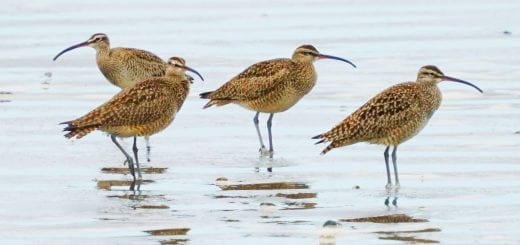Listening in on Jupiter, or at least trying to do that.

Trying to hear Jupiter
Members of the Ducks on the Air Amateur radio club, a group that I advise, gathered in February 2022 to see if they could listen in on Jupiter. Is there life on Jupiter broadcasting radios shows? We don’t think so, but Jupiter does emit radio energy. This energy is strong enough that we can pick it up here on Earth. Back in the 1950s two Astronomers, breaking ground in the field of radio astronomy, strung up a set of set of antennas to record radio signals from the skies. They homed in on one frequency around 20 M hertz and then just as Jupiter sank below the horizon, the signal stopped. The next night they repeated the process and again, when Jupiter set, the signal stopped. Yes, Jupiter was the source. This was new and exciting news in the universe of astronomy.
As we set up on that February evening, we tried to repeat the process. Our big challenge was finding the signal amongst an onslaught of new radio transmissions from radios here on Earth. Our time was short, too, for the project. Jupiter and Earth’s orbits were soon going to be at opposite ends of their orbits around the Sun. This meant the Sun was going to block Jupiter from Earth’s view for many days to weeks.
So, look at the RadioJove Project from NASA, we built antennas. We tuned them to the right frequency, erected poles and guy-wires to them up, plugged the antenna feed into a software defined radio, also plugged into the our field laptop, and began to scan frequencies in the right range. Once that was setup, we just waited for Jupiter to set. If we were on the right track, one of our signals we were following would disappear at that moment. We can’t say were we successful finding the right signal but we did inspire some folks look up at the planets and stars above and maybe also to build radios to explore the universe.

Our 20 MHz (15-meter long) antennas and feed-lines
Along the way in the process, our local public radio station, KLCC, got wind of our experiment and Brian Bull came out to interview the group. It was unexpected. The interview went well, but I am certain Brian had hoped for more. We did too. Later, KLCC used our little experiment as a fund raiser hoping that KLCC would hear more from its members than we did from Jupiter. It was all in fun, as was our experiment.
I do have one disclaimer in this story. One of those early astronomers was my Uncle Kenneth Franklin, who later went to the Hayden Planetarium. Neil deGrasse Tyson now holds that position, and Neil went on write about my Uncle’s work for the Bulletin of the American Academy of Science. As I just mentioned, it was fun trying to follow in my uncle’s footsteps, success or not on our own radio challenge.


